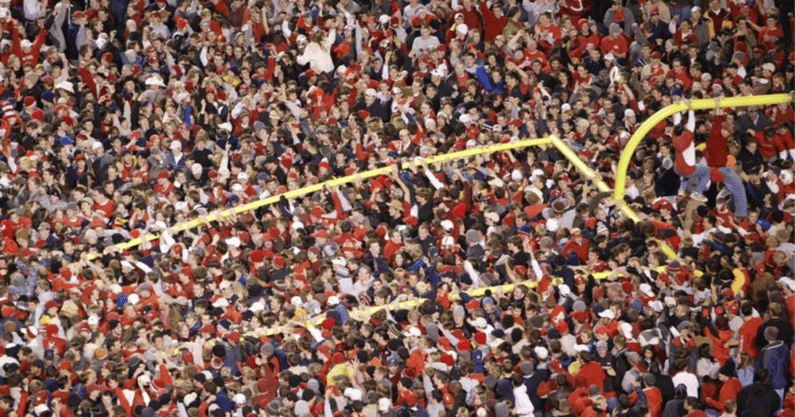NCAA makeover won’t change fans’ emotional ties, which is what drives college sports

The NCAA came to life 117 years ago because President Theodore Roosevelt told university presidents that if they didn’t fix college athletics, Washington would.
A generation ago, scandals had gotten so bad that NCAA members enacted reforms because if they didn’t, Washington would.
Today, NCAA members ask politicians to enact reforms that athletic officials don’t have the will to do themselves, and Washington won’t.
The officials are shameless in asking, even as Congress has more important things it isn’t doing, even if “Less Effective Than Congress” is not a bumper sticker anyone wants on their car.
Besides, it’s hard to know what a scandal is anymore. We’re paying student-athletes above the table now. Coaches heard on audiotape discussing the payment of recruits continue to coach. The NCAA’s attempt to maintain amateurism in the wake of its members generating billions in revenue caused the U.S. Supreme Court to raise nine sets of eyebrows.
The NCAA, like any elderly man or woman staring at mortality in the mirror, has decided the answer to better health is to lose weight. Members voted last week to reduce the NCAA Constitution from 43 pages to 19. They legislated principles rather than rules, core values rather than specifics. This may be nothing more than acknowledgment that the world of arcane college athletic rules has gone the way of short basketball shorts and knee-wrecking Astroturf.
The best coaches always have lived in the white space between the lines anyway. Bear Bryant read the NCAA Football Rule Book with the focus of a Talmudic scholar. If the rules didn’t specify that something could not be done, Bryant did it. In one game in 1974, Bryant sent in a kicker on fourth down. The defense responded with two 155-pound “ends” who could block kicks. Bryant hustled his kicker off the field and ran the ball over one of the 155-pound ends. The NCAA Football Rules Committee responded by passing a rule stating that if you come on the field, you must play a play.
In the modern day, Nick Saban decided that the limit on assistants didn’t apply to “analysts.” Alabama soon had more analysts than some Wall Street firms, and now so does every program trying to beat Alabama. The NCAA enforcement apparatus sat by and watched.
That’s pretty much all they have done for the past decade. NCAA enforcement always has been a thankless job, a bucket of rags against the flood of coaches and administrators doing what they thought they needed to do to compete, to win, to save their jobs.
Top 10
- 1New
Predicting AP Top 25
Expecting big movement
- 2
Tempers flare
LSU-UK gets heated
- 3
Unacceptable chant
Arizona apology to BYU
- 4Hot
Bracketology
Wild March Madness on deck
- 5
Chad Baker-Mazara
SEC officiating call out?
Get the On3 Top 10 to your inbox every morning
By clicking "Subscribe to Newsletter", I agree to On3's Privacy Notice, Terms, and use of my personal information described therein.
You can choose which scandal spelled the death of NCAA enforcement. I’ll vote for North Carolina’s academic fraud last decade. A bunch of athletes received grades for work they didn’t do. The NCAA let the university slide because non-athletes had received the freebie grades, too. As long as everyone benefits from academic fraud, we’re good.
Without effective enforcement, and with nothing more than newly enunciated core values and principles as framework, the NCAA Division I Transformation Committee now must decide what rules its membership will live by, and can live with. The new NCAA is an acknowledgement, if not an acquiescence, to the power of the marketplace that has driven college football to financial heights.
What rules the NCAA creates will continue to try to square the circle that it has tried to square for more than a century, the one where the rules create a level playing field. There is no such thing, not when college football just means more in the SEC than it does in the Pac-12; not when no team outside of California ever has won a men’s or women’s water polo national championship (the men have been playing since 1969, the women since 2001).
There must be some rules by which to compete, of course, but NCAA members have learned the hard way that the once-unimaginable monies they have generated come with consequences. It turns out you can’t build an empire on the natural gifts and hard-earned sweat of student-athletes without allowing the gifted and the perspiring to earn more than tuition, books, room, board and swag.
The Rubicon that the NCAA remains unwilling to cross is the one where the student-athletes earn that money from the schools themselves. Administrators fear labor law. They fear that salaries will dissipate the emotional ties that keep alumni (and the rest of us) tethered to college athletics. I used to think that, too. I’m not so sure anymore.
The reasons that fans remain interested have remained the same since Princeton and Rutgers played whatever they thought football was in 1869. We root for laundry. We root for a school because it represents our state, or our youth, or both. Those emotional ties haven’t changed. I don’t think they will.